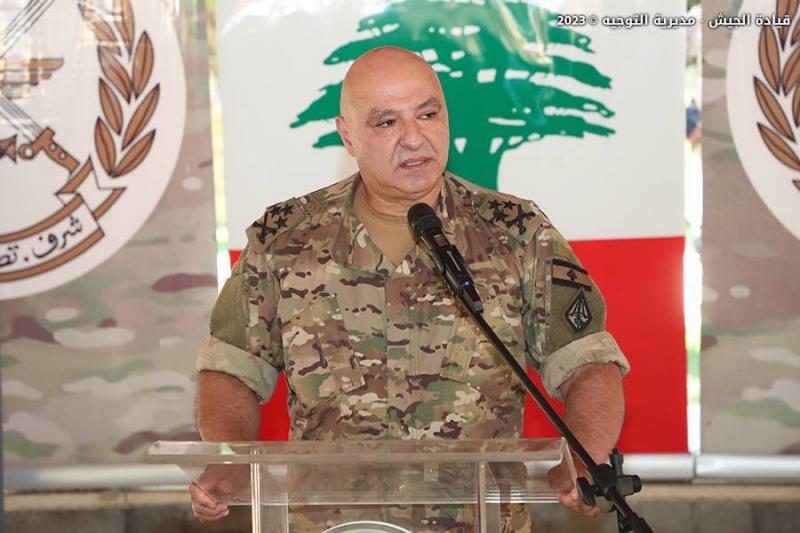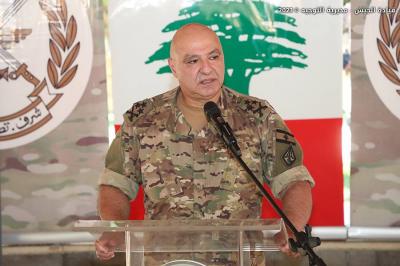Army Commander General Joseph Aoun affirmed that the influx of Syrians poses an existential threat to Lebanon and its citizens, which must be addressed at both individual and institutional levels. He stated, "The army is far from being racist; it prioritizes human rights and places them at the core of its mission. However, these rights exist to preserve human dignity, not to destroy society." He pointed out that "we hear some voices questioning the army's role in border protection based on known political positions. We have not seen these individuals make efforts to support the army; instead, they attempt to obstruct its work and raise suspicions about it. We have not seen any significant participation from them in addressing the Syrian displacement crisis." He added, "Some of these voices that accuse the military institution and question its role in border protection have refused to send their ministers to the cabinet to discuss the refugee issue."
Continuing, he remarked that these individuals have not even offered assistance to the army; rather, "they have placed obstacles in our way." He told them, "We continue because our goal is the interest of the nation, while your goal is your personal interests. We die for the sake of the nation, and you are killing the nation for your sake."
During the inauguration of a road network in the outskirts of Hermel, he said, "We tell them that we are persistent because our goal is the country and its interests, while your goal is your personal gain. We die for the country to live, and you are killing the country for your interests."
The road network includes the regions of Wadi Fisan, Marah al-Shaab, Qanafidh, and Harf al-Samaqa. He unveiled a memorial at each of these sites, in the presence of Baalbek-Hermel Governor Bashir Khodr and several regional notables. The Lebanese Army stated that these newly inaugurated roads connect the mentioned areas, facilitating the fight against human, goods, and contraband smuggling, and allowing citizens to access their lands.
General Aoun visited the Marah al-Shaab and Harf al-Samaqa centers, where he learned about the measures taken to monitor and control the borders, met with military personnel, and praised their resolve, faith, determination, and professionalism in executing their duties despite the significant difficulties posed by weather conditions and terrain. He regarded that the security of the nation is largely contingent on the security of its borders.
He addressed them saying, "You are the watchful eyes of Lebanon, and your mission here is sacred. Before the army deployed at the borders, they were open to drug and weapon smuggling and the passage of terrorists, but they are now, to a large extent, controlled thanks to the military units stationed here. The leadership is aware of the magnitude of your achievements and sacrifices, and it strives to improve your service and living conditions through various means. Thanks to you, history will remember that the army saved Lebanon."
He also visited Sheikh Yassin Ali Jafar and met with regional figures, including religious leaders, mayors, elders, tribal leaders, and families of martyrs, thanking them for their warm welcome and love for the army. He emphasized that the tribes in the area are an example of moral integrity and that they are innocent of criminals and lawbreakers who seek refuge among them. He noted that residents of the Baalbek-Hermel area have sent many of their finest sons to serve in the military institution, many of whom have fallen as martyrs or been injured.
He added, "The army exerts its utmost efforts to establish projects that facilitate life for the residents in this area through assistance from Lebanese citizens and friendly countries as part of its developmental mission, alongside its primary mission of maintaining security and stability. The roads inaugurated today were completed with assistance from American authorities and Lebanese citizens who love the military institution. This assistance in its various forms has enabled the army to continue, thus contributing to the survival of the nation."
From his side, the Governor of Baalbek-Hermel thanked the army for its sacrifices and efforts to establish security and maintain civil peace, which has created the conditions for an active tourism season this year. He stated, "Many have tried to drive a wedge between the army and the tribes of Baalbek-Hermel, but they have forgotten that the tribes have given the best of their sons to the military institution, and no one can claim to love the army more than them. I reiterate my gratitude to the army for its efforts within the governorate to combat smuggling and human trafficking, as well as for its honorable performance in various regions of Lebanon."
Governor Bashir Khodr appreciated the army's initiative to inaugurate the road network in the outskirts of Hermel, believing that the path to development starts with developing the roads, and that these roads embody the military institution's role in bringing together Lebanese people by connecting regions and provinces with each other.




